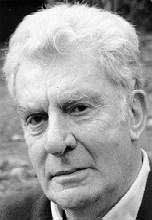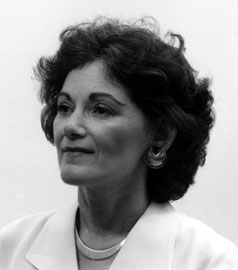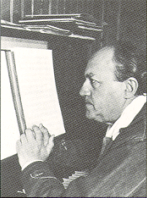|
|
|
Jewish Sounds Jewish Music in a Classical Vein Although the participation of Jews in Western art music is hardly a recent phenomenon, Jewish composers setting Jewish liturgy for concert purposes is. Below are several new recordings of classical music with a Jewish spin, some of it very fine music indeed. And excitingly enough, four of the recordings present the work of living composers. Bloch, Ernest: "Bloch Performs Bloch" (Jewish Music Heritage); "Sacred Service: Avodath Hakodesh" (Rockport). Rare recordings of Bloch's Sabbath service setting, performed by the London Philharmonic in 1949 with the composer himself conducting, sung in English by the London Philharmonic Choir and bass-baritone Marko Rothmüller. This piece is simply smothered by its own sincerity. There are flashes of brilliance in the writing, but too often it descends into Hollywood-pious mode. Despite superb performances and elegant remastering by John Wilton and Graham Newton, this is pretty heavy going. The JMH recording also includes versions of "Schelomo" and "From Jewish Life." Rating: 2 ½ stars, 3 ½ for historical value. Downtown Music Productions: "Composers of the Holocaust" (Leonarda). The dozen composers represented on this excellent recording are the victims of history in a way that almost no other composers can claim. Each died in the Shoah and, with the notable exceptions of Mordecai Gebertig and Ervin Schulhoff, the vast majority of their output was destroyed. Recordings such as this one perform a service that goes beyond the realm of musical history. That said, most of the music here is of more than historical interest, and the performances under Mimi Stern-Wolfe's baton are excellent. Understandably, a dark and brooding record but well worth hearing. Rating: 5 stars. A suitably grim Ernest Bloch. Maybe he's just heard the recordings reviewed above. High Holiday Music of Belsize Square Synagogue, London (Jewish Music Heritage). Belsize Square is one of the premier Liberal synagogues (i.e., Reform) in London; the repertoire here is Classical Reform, largely Louis Lewandowski, with a big baritone cantor, Lawrence Fine, and a choir and organ. If you don't know this music, it's a great introduction, mostly well performed although the high voices in the choir are a bit shrill. Lewandowski is an acquired taste, a bit too German Protestant for me. (On the other hand, that may be because it's the liturgical music I grew up with.) Rating: 3 ½ stars, but add another star if this is your style. Laitman, Lori: "Mystery: The Songs of Lori Laitman" (Albany). An intelligent and tasteful first recording for Laitman, a graduate of Yale School of Music who set out to write theater music but is represented here by five song cycles, including a moving setting of poetry from the children of Terezin. Not surprisingly, one of her great strengths is a sense of the dramatic, and much of this music has a theatrical flair (not to mention echoes of William Bolcom and Stephen Sondheim). Ably sung by Lauren Wagner, William Sharp and Phyllis Bryn-Julson. Rating: 4 ½ stars. Master Chorale of Washington Chamber Singers: "Holocaust Cantata" (Albany). The main event here is a "cantata" arranged by Donald McCullough, the Chorale's director, composed of music written in the camps, interspersed with passages from diaries and memoirs of survivors. The set concludes with six more songs and a chamber piece written by Szymon Laks in Auschwitz. The result is powerful and somber, but the spoken passages break the flow and, although they place the material in its larger historical context, they seem almost superfluous. Rating: 4 stars. Milhaud, Darius: "Service Sacré pour le samedi matin (Sabbath Morning Service)" (Rockport). This is a very disappointing record, a reissue on CD of a 1954 recording of the Milhaud settings made at Central Synagogue in New York, with that congregation's cantor, Frederick Lechner, and choir. The sound is murky, the performances well-meaning but stolid, and the entire piece plays like a dirge. Historically important but little more. Rating: 1 star. Rebling, Jalda: "Juden im Mittelalter: Jews in the Middle Ages" (Raum Klang). A fascinating collection of medieval texts and music that is either an improvisation in the period style or, in a few cases, authentically of the period. Rebling has an ethereal, often haunting voice that may wear on some over the course of an hour of music. There are some odd moments when she seems to have slipped through a timewarp from Brecht and Weill country. First-rate musicians behind her. Rating: 41/2 stars. Sheriff, Noam: "Revival of the Dead" and "Genesis" (Signum). Sheriff is one of the better-known contemporary Israeli composers, here ably served by the Israel Philharmonic under Zubin Mehta and, among others, Cantor Joseph Malovany. "Revival of the Dead" is a four-part cantata on the Holocaust which draws heavily on Sheriff's weakness for bombastic modernism. Playing off liturgical material like "Avinu Malkeinu" and Yiddish songs like "Oyfn Pripitchok" against dark orchestral tapestries and portentous tympany lines is a dreadful cliche, but this music does have a certain blunt-force-trauma kind of power. "Genesis" is a short piece for children and orchestra that is a bit more interesting, but basically much the same. Rating: 3 stars. Silver, Sheila: "To the Spirit Unconquered" (CRI). Silver is a contemporary American composer and this is a good sampling of her work with pieces ranging from 1978 to the mid-'90s. Her style is a mercurial mix of atonal and tonal, particularly effective in the title piece, a piano trio inspired by Primo Levi's Holocaust memoirs. Most of this is abstract, almost violent music, difficult, edgy, nervous. As a result, the quiet moments are even more shattering. Rating: 4 ½ stars. Jewish-American composers Sheila Silver and Robert Starer, both of whom have recent
recordings on CRI. Starer, Robert: "String Quartets 1-3" (CRI). The Viennese-born Starer left his native country after the Anschluss for Palestine, then came to New York to study at Juilliard in 1947, when the first of these three works was written. Starer is a prolific and elegant composer, but he didn't return to the string quartet for 48 years, writing his second one in 1995 after hearing the Miami String Quartet perform his first one inspired him to write Nos. 2 and 3 for them. This lovely recording by the Miami gives us a neat encapsulation of an important American composer's career -- American with a Viennese and Jewish accent. Starer's writing is redolent of Viennese grace and harmonic richness, Jewish plaintiveness (although not in obvious ways) and American rhythms. A splendid record. Rating: 5 stars. Viennese Synagogue Music in the Age of Schubert (Jewish Music Heritage). Solomon Sulzer was the first major figure in modern Jewish liturgical music, a contemporary and friend of Franz Schubert and the focus of this interesting CD. Sulzer brings a certain neo-classical restraint and stateliness to his prayer settings, which may be why they aren't heard as often today as the more florid emotionalism of Louis Lewandowski. Also included are works by a couple of Sulzer's predecessors and Schubert's setting of "Tov L'Hodot," a lovely tribute by one composer to another. This is a handsome recording with nicely judged performances by cantors Lawrence Find, Bryan Kesselman and Robert Brody. Rating: 4 ½ stars. For the CRI recordings, go their website. Jewish Music Heritage Trust, which is responsible for several of the CDs reviewed here, is based in Manchester, UK. Here's their website. Of course, you can always find a wide selection of music, Jewish and otherwise at Amazon.com, and your purchases will help Beth Am, The People's Temple. Just click here to find what you want. |


